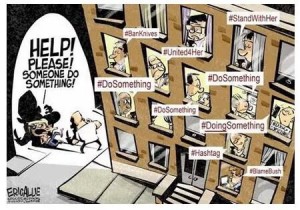Kitty Genovese was murdered out on the street and 38 people watched from their apartment windows…weird right? In an instance where someone is in eminent danger I think we would all like to believe that we would help the person in trouble, however a study done by John Darley and Bibb Latané suggest that if you are in a group you are likely to do nothing at all. However, we are not completely thoughtless; they also found that it is very likely that if you are alone you will do something whether that be directly or trying to get help. You are probably no think why wouldn’t anyone do anything; well in many social science you are taught that there are barriers of independent behavior. This means that when you are in a group you are likely to conform to what the rest of the group is doing instead of speak up. There are a number of barriers of independent behavior, and in this case it was diffusion of responsibility. No one saw anyone else do anything so they analyzed the situation as normal, possible hoping that someone else would do something. However, the truth is unless one person decides not to conform to the group the whole group will likely not take action. I thought that this was a little crazy to think about at first, but after looking at John Darley and Bibb Latané’s study as well as a meta-analysis it seems to be true.

In Darley’s and Latané’s study the null hypothesis was that being in a group does not affect a person’s reaction; while the alternative hypothesis suggest being in a group does affect a person’s reaction. To test the alternative hypothesis they had smoke coming out of a closed door into a room where people were working. First they would send one person in and watch their response and then they would do the same thing except with multiple people in the room. They later tried an experiment where people had headsets and an actor pretended to have a seizure once again first doing it with one individual and then with a group. In both examples participants that were alone were more likely to do something than those in a group. At the end of the study they decided to reject the null hypothesis.
Through meta-analysis I was able to determine the accuracy of their result better. The studies that made up the meta-analysis were done during the 1960’s to 2010, and over 7,000 people were tested; the likelihood that the results for all these studies were due to chance is very small, so I believe that it is most like being in a group that changes a person’s reaction. I found that reverse causation could not happen in this case because a person’s reaction is not the deciding factor of whether they will be in a group they already are or are not. However, I also found that third confounding variables may play a role in people’s reactions. For example many other studies showed that the perception of how dangerous it was to do something affected the result. People’s behavior changed when the perpetrator was there versus not and whether they could be in any physical harm or not. I realize that it is hard to analysis human behavior because we’re are not all necessarily the same but the studies doe to prove the bystander effect are very convincing.

The bystander effect is very interesting concept. If we see something bad happening such as someone collapsing, we would all rush to help them. This is probably true if we are by ourselves but if a lot of people are there then we won’t do anything. We don’t want to have to help but if we are the only one’s around we do because it’s the right thing to do. If we are in a crowd we decide to let someone else handle it. This post is a very good, I especially liked the study that was done because I find it amazing that people would ignore smoke just because they are in a group. This video shows a fake abduction to see if people would help:
Sadly for this, she had also not be completely killed after the first attack, she lay there for another hour or so and then the murderer came back and finally killed her. All awhile, no one did a thing. not even as she lay there asking for help while the killer was gone. It makes me think of mob mentality BUT it is almost the opposite effect. were people really that scared that they couldn’t react and help her. Also, what about fight or flight syndrome for the viewers. Some people simple kick into action while others run from it. Its just mind blowing why not one person helped.. Very sad